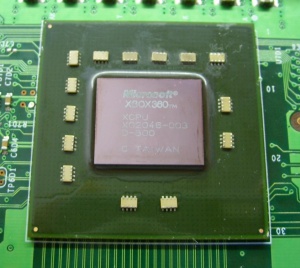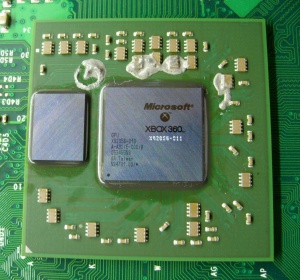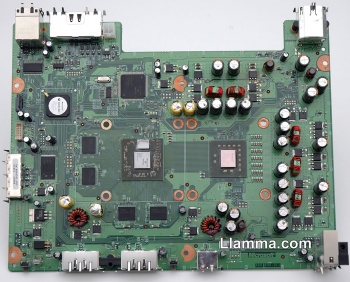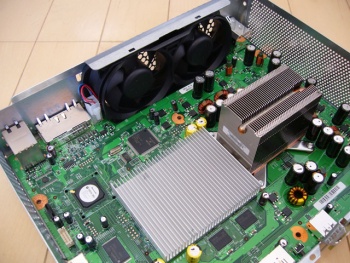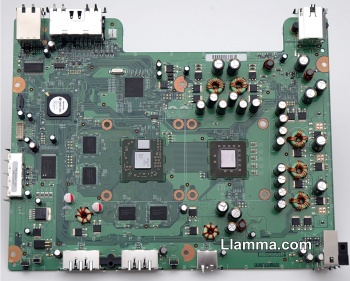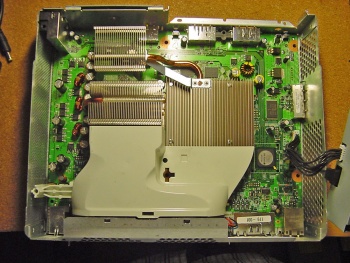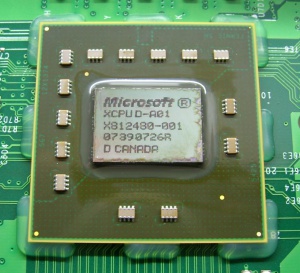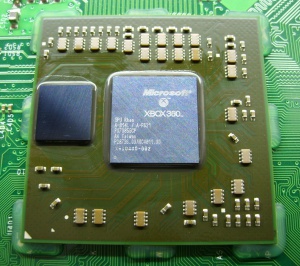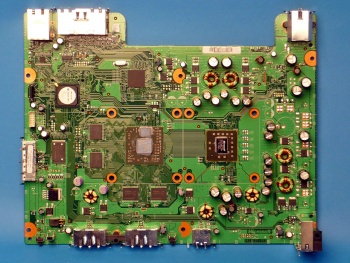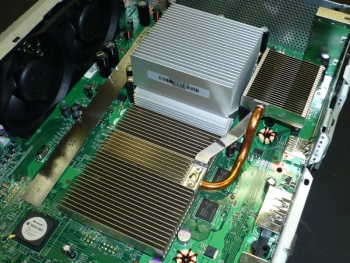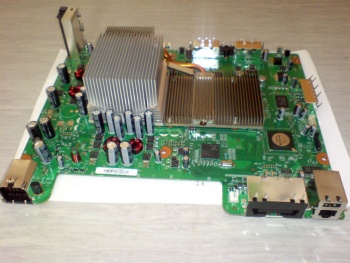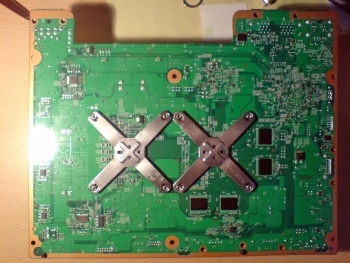Xbox 360 Revisions: Difference between revisions
(→Zephyr) |
(→Falcon) |
||
| Line 31: | Line 31: | ||
[[Image:Xbox 360 revisions 65nm cpu.jpg|thumbnail|right|IBM 65 nm CPU]] | [[Image:Xbox 360 revisions 65nm cpu.jpg|thumbnail|right|IBM 65 nm CPU]] | ||
[[Image:Xbox 360 revisions 55nm gpu.jpg|thumbnail|right|ATI 90 nm GPU and smaller embedded DRAM chip]] | [[Image:Xbox 360 revisions 55nm gpu.jpg|thumbnail|right|ATI 90 nm GPU and smaller embedded DRAM chip]] | ||
All Xbox 360 Premium machines and Arcade machines manufactured August 2007 introduced the new 65 nm CPU accompanied with a new cooler and still 90 nm GPU with the Zephyr cooler. The motherboard is based on Zephyr and | All Xbox 360 Premium machines and Arcade machines manufactured August 2007 introduced the new 65 nm CPU accompanied with a new cooler and still 90 nm GPU with the Zephyr cooler. The motherboard is based on Zephyr and requires fewer components (some capacitors and coils removed) for the new 65 nm CPU, resulting in lower costs. Starting September 2007 the newest Xbox 360 Premium machines shipped with the Falcon board. Xbox 360 Elite machines were eventually updated to Falcon boards too. Xbox 360 packages with LOT number 0734 or higher will most likely be Falcon machines. | ||
* IBM 65 nm CPU | * IBM 65 nm CPU | ||
| Line 37: | Line 37: | ||
* Bigger and enhanced CPU cooler | * Bigger and enhanced CPU cooler | ||
* Fewer voltage regulators, capacitors and inductors | * Fewer voltage regulators, capacitors and inductors | ||
* New power supply connector and lower 175W output | |||
[[Image:Xbox 360 revisions falcon motherboard.jpg|350px]] [[Image:Xbox 360 revisions falcon cooling.jpg|350px]] | [[Image:Xbox 360 revisions falcon motherboard.jpg|350px]] [[Image:Xbox 360 revisions falcon cooling.jpg|350px]] | ||
Revision as of 11:56, 19 August 2008
Xenon
The original Xbox 360 configuration used in the initial Premium and Core machines released in the end of November 2005. These are also know as the RRoD (Red Ring of Death) machines because the GPU chip warps away from the motherboard because of excessive heat.
- IBM 90 nm CPU
- ATI 90 nm GPU and on-chip DRAM
- Small GPU cooler
- Standard CPU cooler
Zephyr
Zephyr was the first revision with HDMI connector and fixed the RRoD problem cause by the inadequate GPU cooling on Xenon boards. It was introduced with the Xbox 360 Elite in May 2007. In July 2007 Xbox 360 Premium machines began appearing with the Zephyr motherboard.
- New Elite model included 120 GB hard drive
- Updated motherboard layout
- HDMI connector
- Extended GPU cooler
- Still 90 nm CPU and 90 nm GPU
Falcon
All Xbox 360 Premium machines and Arcade machines manufactured August 2007 introduced the new 65 nm CPU accompanied with a new cooler and still 90 nm GPU with the Zephyr cooler. The motherboard is based on Zephyr and requires fewer components (some capacitors and coils removed) for the new 65 nm CPU, resulting in lower costs. Starting September 2007 the newest Xbox 360 Premium machines shipped with the Falcon board. Xbox 360 Elite machines were eventually updated to Falcon boards too. Xbox 360 packages with LOT number 0734 or higher will most likely be Falcon machines.
- IBM 65 nm CPU
- ATI 90 nm GPU
- Bigger and enhanced CPU cooler
- Fewer voltage regulators, capacitors and inductors
- New power supply connector and lower 175W output
Opus
This is an intermediate motherboard with 65 nm CPU and 90 nm GPU, new coolers, but no HDMI. It will be used in Xenon chassis for repaired and Red Ring of Dead affected machines.
Jasper
Jaster will be released in late 2008 to introduce the 65 nm GPU and reduce the cost and power usage further.
Valhalla
A future version that will have both the CPU and GPU on a single die.
References
- Inside the Xbox 360 Elite
- Inside Launch Microsoft Xbox 360
- New Falcon Motherboard
- Second Xbox 360 codename Zephyr
- How to see 65 nm
- Falcon Xbox Pictures
- Xbox 360 goes 65 nm
- First pictures of Opus motherboard
- New Xbox 360 Opus motherboard
- Wikipedia Xbox 360
- Xbox 360 Xenon, Zephyr, and Falcon motherboard pictures
- Wikipedia 65 nanometer lithography
